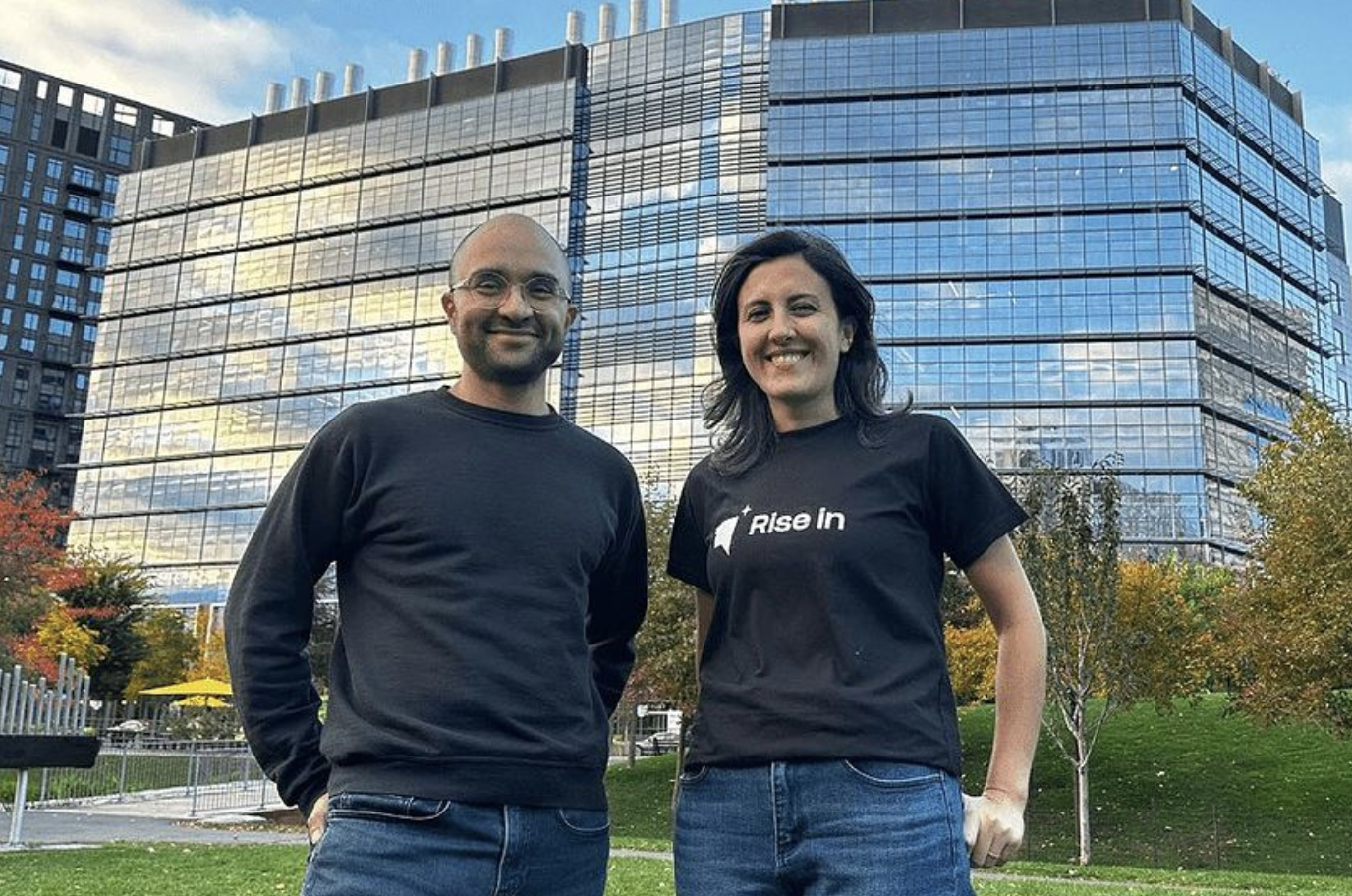Gülcan Yayla
Co-founder, CEO
July 20, 2023
Our approach to web3 training at Rise In
We train developers at scale - our online ed platform reached 180k+ developers before we decided to launch Rise in.

We’re launching Rise in with the vision of making it the go-to place for anyone in the world curious about learning and building web3.
Our journey of developer training started back in 2014 when Emre was founding one of the first coding bootcamps in St. Louis, MO. In the past 9 years, our journey helped literally thousands of people find jobs in tech. We then started training developers on web3 in April 2022 after receiving demand directly from these developers.
At that time, 100k+ developers from Turkey were already taking programming courses from Patika.dev. Providing new content for this audience was a natural extension of our work.
But things got bigger than we thought. We have started seeing demand for structured training from all around the world:
- 10% of applications for our web3 courses are coming from 40+ countries outside Turkey (fully organic), including Mexico, Greece, India, UAE, Sri Lanka, UK... Actually, our first-ever web3 bootcamp graduates were from Nigeria and Ukraine. Totally unexpected!
- We’ve received requests from a CS student group in Ethiopia to use our course content.
- We’ve received requests to do bootcamps in India.
That’s why, we’re opening up our content and bootcamps to everyone in the world.
What is the opportunity we see in web3?
We would like to help people understand web3 and make web3 communities more inclusive for people from anywhere in the world. We see a big opportunity in web3 to address some of the most pressing problems in the world because of the following reasons:
An opportunity to solve many inefficiencies
The current client-server model results in many inefficiencies, unwanted costs, and lack of control over our privacy. The capacity to address most of these problems and even to change how the society is organized is an opportunity that we cannot ignore even if there is still a very long way to go for web3 technologies. We believe that technology is just a tool and it's on us to create meaningful solutions using it.
Accelerating remote collaboration and job opportunities
After Covid-19, the world has already started to flatten thanks to remote work opportunities. web3 companies are accelerating this trend since most career opportunities are location agnostic. Some examples include:
- Zero Knowledge University providing $15,000/year basic income for web3 developers building products with zero knowledge proof technology, and half of their students come from Africa and India.
- Superteam providing many earning opportunities for people around the world and already distributed $2 million to its community in India.
- OpenZeppelin job page: “We don’t let geography or borders define us: we are a distributed team with members all over the world.”
- Chainlink job postings: “This role is location agnostic anywhere in the world, but we ask that you overlap some working hours with Eastern Standard Time.
This approach levels the playing field for anyone from anywhere in the world. We are especially interested in using this opportunity to benefit people from emerging countries.
Why Rise in web3?
We’ve been running impactful, large-scale training programs
Before Rise in, our team created one of the world’s largest employer-funded training programs. We already became the largest developer community in Turkey and we’re expanding globally.
We train developers at scale - our online ed platform reached 180k+ developers before we decided to launch Rise in.
Providing education is one of the most challenging tasks in life. Large-scale and impactful training programs requires laser focus and countless iterations of education over the years
Education is tasked with changing a person’s mind and soul - and this kind of change is the most challenging one. So, we believe that only organizations that can run impactful educational programs are those who have had a deep experience and intentional focus on training people. Even if an impactful program is created, scaling it up requires continuous process improvement and iterations - because the outcomes of a training program are dramatically different at small and large scales. That’s why education startups see the outcomes of their efforts several years after they started, and there is much limited funding towards these startups compared to funding in other fields.
As the Rise in team, we have put our heart and soul into providing quality and accessible educational opportunities for many years. Our founding team has led some of the most influential tech education nonprofits in the US and Turkey (LaunchCode, Kodluyoruz and Patika.dev) before starting Rise in. With a team that has 20+ years of collective experience in experimenting with many educational approaches, we are ready to use our skills in the web3 space.
Key learnings from our 20-year of training program experience can be helpful in web3
We have several key learnings about talent programs that can also be applicable to web3:
- Hundreds of thousands of people don’t know how to switch careers even if they want to do so - actually, they often aren’t even aware of opportunities. Environmental factors tend to motivate them to stay wherever they are.
- People trying to upskill themselves / make a career change have to consistently follow a very challenging pathway full of frustrations and self-doubt. Most people can’t stay motivated to do so especially if they lack a community to support them in this journey.
- The abundance of content on the internet is a double-edged sword. While it provides almost infinite self-learning opportunities, it makes finding/creating a reliable skills development roadmap very difficult. Even in web2, we have met thousands of people consuming content on irrelevant subjects for months but have not built anything. This challenge is even bigger for web3 where there is even much less structured content.
- Education is only possible with a fun and motivational experience. When individuals are left alone, only a fractional percentage of participants succeed as the 1%-5% range of MOOC completion rates show. Long-term development is possible only when people have fun and can get micro feedback and feel the “virtuous cycle”.
- Training programs should have clear outcomes for their participants. Most people don’t want to complete a training/project just for training/project sake, they need to see an outcome, and the most motivating outcome is job opportunities. We don’t consider a certificate or NFT as a motivating outcome since they don’t answer the question “What is in it for me?” for participants.
Which gaps are we trying to fill?
The good news is, there is an increasing number of web3 educational resources and communities all around the world. In this growing ecosystem, we think we can add value by trying to fill in these gaps:
Lack of training connected to job opportunities
While early adopters tend to start learning mostly because of high intrinsic motivation, crossing the chasm requires the ability to explain the benefits of onboarding to web3 to the mainstream market. Some of the current mechanisms to motivate people to learn and earn mechanisms, NFT awards, certifications, or emphasis on the high-income potential. We think these are not sufficient to convince the mainstream market. In our experience, a clear and realistic understanding of job opportunities waiting for someone if they complete a training program is critical. We’ll try to make sure our training programs start by explaining to people why it makes sense to spend hours on this content in terms of the impact on their careers.
Lack of structured, beginner-friendly pathways
Most current web3 educational resources tend to serve early adopters. This audience comes with their motivation, but the mainstream audience needs a clear pathway and structured support to succeed. We see a lack of beginner-friendly and well-structured web3 resources that take anyone from point zero to more advanced content in time. This also leads to many developers not taking the steps to train themselves in web3 and so staying cautious.
We learned how to develop structured pathways in web2 after helping 3,000+ people get their first jobs in technology, so we think we can add tremendous value to cross the chasm.

*Image from https://cre8tivecapital.com/crossing-the-chasm-help-your-startup-reach-the-mainstream-market/
Huge, overlooked interest in developing countries
There is very high interest in web3 among people in the developing world, partially because of people’s distrust in economic policies. Although developers in these markets are highly interested, they still lack community and learning resources to onboard themselves to web3. They feel isolated and at the periphery of developments as many of our community members reported. The implications of web3 on our lives are so big that we cannot afford to allow anyone to stay behind just merely because of a lack of opportunities.
Lack of clear pathways for professionals other than developers
Good news: There are many job opportunities other than programming jobs in web3, such as community managers, technical writers, and legal consultants. However, we again see a lack of clear, structured pathways to help these professionals onboard to web3 technologies. Most advice doesn’t go beyond “join DAOs, be active on Twitter and Discord” etc. But this advice is welcomed by only the early adaptors most of the time. Although at Rise in, our first focus will be developers, we may address this gap in time or help other communities do so.
What we are not trying to do
We are concerned about the growing disparity in the world and we don’t want web3 to accelerate it
While we applaud the technological advancements, we are concerned about the growing income disparity between tech and nontech jobs, and gender-based and racial differences within tech. We already see a stark difference in the participation level of different genders and geographies in the web3 space. So, we should be really careful about who we have and don’t have in web3 training, especially considering the high-income potential of web3 jobs and the potential to widen the existing disparity.
We don’t want the income potential to become the main motivator for people to join the training
We see a danger in attracting people merely with the high-income potential of web3 jobs. This may lead to creating groups of people that are solely focused on monetary conversations rather than willing to understand the deeper implications of web3. So, while we will all the time try to understand and explain job opportunities, we’ll try not to limit ourselves to income-focused conversations.
We do not want to exclude anyone
There are several prerequisites to onboard to web3, especially for developers. But we are also aware that there are millions of people that don’t meet these prerequisites but would be willing to take steps to do so. We will try to provide resources that will meet anyone at the place they are.
We are not going to teach and learn web3 just for its own sake
We think that technologies are only tools, they are not an end. We’ll try to be mindful of this fact when we onboard new people to the space. There are still many unknowns, and developers simply cannot and should not address all these unknowns by themselves by only focusing on the technical side of things. We’ll do our best to provide this awareness in our community.